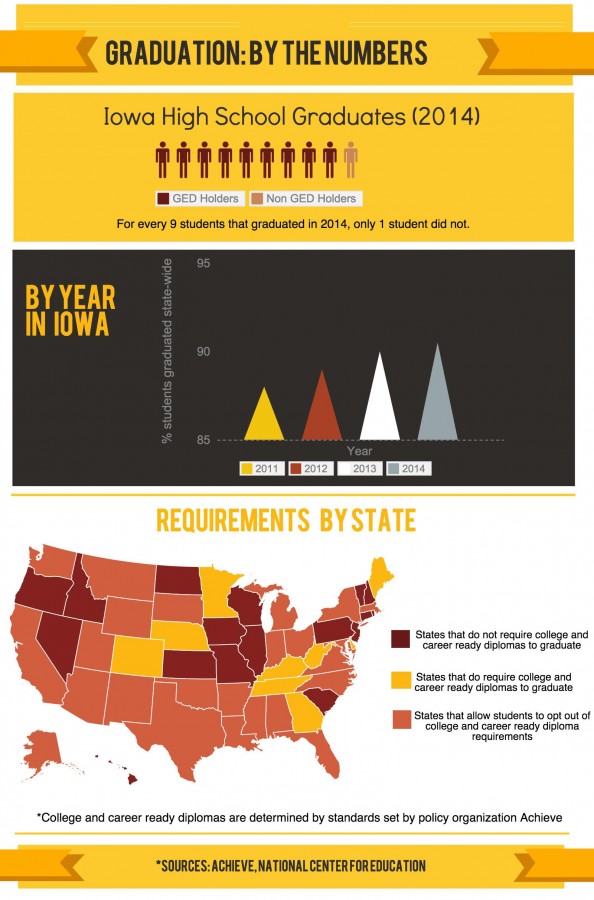Iowa’s Top-Ranked Graduation Rates Raise Questions of College Readiness
February 11, 2016
When the ICCSD school board outlined their plans for 2016, it set three focused goals for the district: higher math proficiency, higher reading proficiency, and the expansion of opportunities across all levels of socioeconomic status. The rise of graduation rates, according to School Board President Chris Lynch, would then inevitably follow.
“Proficiency in the basics helps [students] to be successful,” Lynch said.
Reading and math proficiency, as measured by Iowa Assessment benchmarks, are, for Lynch, the foundation for high graduation rates. That foundation is then built upon what Lynch says separates Iowa–which graduates 90% of its students according to the U.S. Department of Education–from other states: high expectations within the district.
“The key [to higher graduation rates] are clear standards,” Lynch said. “However, how you do that can be a bit different state-to-state.”
The ICCSD uses a definitive line to gage levels of core-curriculum abilities throughout the district. This line varies by school district, which in return determines how high the standard is set.
“I think it depends on what they’re teaching you in the schools. So if a school has lower standards, it doesn’t necessarily mean that [the students] will be ready for college,” Ayla Canin ‘17 said.
Two things differentiate Iowa’s graduation requirements from those of other states. First, Iowa does not require the completion of Algebra II, and second, Iowa does not follow Policy Organization Achieve’s requirements for college readiness. Policy Organization Achieve sets national standards for educational policy and practice. However, Lynch attributes Iowa’s top ranked rates of graduation to support within the district and Iowa’s history of K-12 academic success, not its lenient requirements.
“I think for a long time, the districts have had very good support for our students,” he said.
While the key to college readiness is clear for Lynch, the correlation between graduation rates and readiness is less clear, mainly because there isn’t an agreed upon way to measure college readiness. In the ICCSD, students’ ACT scores, number of AP courses taken, as well as scores on AP exams are the easiest way to put a number on college readiness. Even so, there are more factors that play into it than can be measured quantitatively.
“[Graduation rates and college readiness] are probably correlated, but we make sure to check in on a variety of other things to make sure that our students are prepared for college,” Lynch said.
Canin agrees that, while the correlation is blurred, holding a GED can prove to be helpful in other endeavors, not just in higher education.
“Even if [graduating] doesn’t prepare you for college, the state of having a high school diploma is helpful to get any job,” she said.
For University of Iowa Professor of Education Nick Bowman, graduation rates are a more of a reflection of the differing levels of lenience in graduation requirements state-by-state.
“You can have these high high school graduation rates if the bar is low,” Bowman said.
Bowman, who has been monitoring trends correlating with Iowa’s rising graduation rate, has found that the exceptional high school graduation rate does not necessarily correlate with the college graduation rate in Iowa. According to the National Center for Education Statistics, the graduation rate for Iowa’s four-year colleges is 41.5%, about 50% less than the high school graduation rate. For Bowman, this statistic can be attributed to the changing work ethic from high school to college.
“It tends to be students that have high self-efficacy [that do well in college],” he said. “It’s often students who get involved with meaningful both social relationships, whether those occur informally, or through structured co curricular activities, where they’re really connected to campus.”
The relatively steady support found throughout high schools across the state, along with the support of parents can alter college readiness.
“If what [support] means is not letting [school’s and parent’s] children deal with any challenge in life, it is probably a bad thing,” Bowman said. “Because if you go out into the work world, you’re going to face challenges, and so you need to know how to deal with that.”





















































